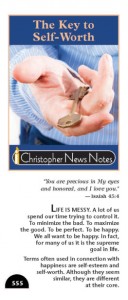 The following is the text of the Christopher News Note “The Key to Self-Worth.” See the end of the post for ways to request a pdf or paper copy:
The following is the text of the Christopher News Note “The Key to Self-Worth.” See the end of the post for ways to request a pdf or paper copy:
“You are precious in My eyes and honored, and I love you.” — Isaiah 43:4
Life is messy. A lot of us spend our time trying to control it. To minimize the bad. To maximize the good. To be perfect. To be happy. We all want to be happy. In fact, for many of us it is the supreme goal in life.
Terms often used in connection with happiness are self-esteem and self worth. Although they seem similar, they are different at their core.
Self-esteem is based on the concept that feeling good about yourself leads to superior achievements and, therefore, happiness. Self-esteem programs often include awards, despite no real effort or accomplishment by the recipient, based on the theory that this fosters good feelings about oneself.
The problem is that this can result in either people who mistakenly think they’re good at everything — or people who never take a risk because they don’t want to feel bad when they can’t accomplish something the first time they try.
Self-worth, on the other hand, is the sense of confidence and respect a person feels from knowing their true, unique value. We may be flawed or fail, but we still have value that is independent of our imperfections. What makes us feel worthy of love and belonging?
Accomplishments and Failures
Self worth, surprisingly, often comes from almost the exact opposite strategy as those designed to give us self-esteem. People with strong self worth know that their accomplishments must be earned, even if it takes lots of practice and failure along the way. They know that doing some-thing risky such as, for example, being the first person to say, “I love you,” carries a chance of failure, but they also know they will never succeed without such risks.
Key researchers are beginning to be heard speaking up on the subject of self-worth although, interestingly, they often come at it from different angles.
Kathryn Schulz in her book “Being Wrong” encourages us not to fear error. She sees it as inevitable, transformative and necessary for creativity.
Daniel Gilbert, author of “Stumbling into Happiness,” has done studies showing that all our worrying often just leads to unnecessary dread. In fact, even if the negative event we’re concentrating on does occur, many people find that it’s not as bad as all the dread they experienced beforehand. Our imaginations often take us to a darker place than reality does.
Brené Brown, a social work research professor, believes there’s power in vulnerability. She has found that those who are willing to take risks in order to “be authentic” have an innate sense of self-worth.
In a speech she gave entitled “Daring Greatly,” Brown said, “When we spend our lives waiting until we’re perfect or bulletproof before we walk into the arena, we ultimately sacrifice relation-ships and opportunities that may not be recoverable, we squander our precious time, and we turn our backs on our gifts, those unique contributions that only we can make. Perfect and bulletproof are seductive, but they don’t exist in the human experience.”
In short, what many people are advocating are the very things that we fear deep down: taking chances, making mistakes, putting ourselves in positions where we may be judged as weak. The truth is that we know, and God knows, that we are flawed and imperfect beings. When we admit it in daily life and take chances despite our fears, we give ourselves room to stretch, to learn, to love, and to soar.
Made in His Image
This is something that Maura Byrne discovered. A 26-year-old struggling to recover from years of physical abuse, an eating disorder, and serious self-image issues, she found courage in Blessed John Paul II’s words: “Do not be afraid. Do not be satisfied with mediocrity.”
She says, “Those words taught me to rise above all that was going on in my life and to not be afraid to take those small leaps of faith, knowing that God the Father is right there next to me. John Paul II’s words helped me gain confidence and strive to take my life back, to turn from a victim to a survivor. I still have those words on my wall and I turn to them all the time.”
Byrne eventually founded “Made in His Image,” a ministry for women with eating disorders. It began as a blog, but is now on its way to becoming the first Catholic inpatient medical center for females recovering from eating disorders and abuse. The patients who come to Made in His Image will be treated holistically – body, mind and spirit. Taking risks on her own behalf has set Byrne free to help others.
Nobody’s Perfect
Knowing we are imperfect, but nonetheless worthy of love and belonging, allows us to be patient with our imperfections.
St. Francis de Sales in the spiritual classic, Introduction to the Devout Life, points out, “Though it is reasonable to be displeased and sorry when we fall into faults, it should be without bitterness, anger or sulkiness. … In any case, this sort of annoyance and bitterness with ourselves springs from self-love and leads to pride, for we are merely upset and disturbed at finding our-selves imperfect.”
In other words we need to be kind to ourselves when we fail, just as we would in the case of a friend’s failure.
Interestingly, taking the risks we fear often leads to connecting with others because we are at our most authentic in those moments. When we share ourselves in that way, others recognize it. Often we don’t know what is happening until the experience is behind us because we’ve been working so hard to overcome obstacles.
However, that’s when we surprise ourselves, not only with our accomplishments but with how we’ve grown.
When Olympic gymnast Shawn Johnson earned the silver medal in the individual all-around competition at the 2008 Olympics, she was disappointed that she didn’t come in first place, but also proud that she had performed as well as she had. Her joy was soon replaced by tears when reporters asked her what it felt like to lose, as if she had something to be ashamed of.
That experience taught Johnson an important life lesson. In her memoir “Winning Balance,” she wrote, “God created you in His image; that is where your worth comes from…I realized gymnastics was no longer the most important thing to me…I knew that my friends and family loved me, that God was watching over me, and that I had represented my nation well at the Olympics. All in all, I knew that my life was solid and balanced.”
A King in the Making
Surprises are one thing in fictional books or movies where we expect fantastic plot twists, such as humble maidens discovering they are royalty. But Peggielene Bartels, a secretary at Ghana’s U.S. Embassy in Washington, D.C., was disconcerted when faced with that precise situation in 2008.
An early morning phone call informed her that she had been chosen king (Nana) of her native Otuam, a Ghanaian fishing village. Not only was it unprecedented to have a woman king, but Bartels seemed unqualified for such responsibility. As she considered the question, however, Bartels realized that life in the U.S. and her secretarial experience had uniquely qualified her with the flexibility and perseverance for problem solving.
After accepting the appointment as king, Bartels faced a string of difficult challenges that shook her sense of self worth. Not only that, she experienced an overwhelming sense of failure. As she was resolving not to dwell on her mistakes, Bartels received unexpected public support.
As she recounts in her memoir, “King Peggy: An American Secretary, Her Royal Destiny, and the Inspiring Story of How She Changed an African Village,” a man in the assembly stood up and shouted, “By the grace of God we have a good king. … Whoever goes to bed and whoever wakes up, their last and first thoughts should be to pray to God for Nana, to ask him to give her the strength to do everything she can for this community.”
Bartels realized she had worked hard for her people, “and despite all the obstacles and wickedness she had encountered along the way, they loved her. She floated in the happiness of that knowledge as if it were her mother’s loving embrace.”
“It is difficult to make a man miserable while he feels worthy of himself and claims kindred to the great God who made him.” ― Abraham Lincoln
Dreams of Happiness
There is no one way leading to self worth, but it does seem that the key lies in facing our fears, not settling for mediocrity, trying again after failure, and being authentic even when it makes us vulnerable. Pope John Paul II summed it up perfectly, although he didn’t call it “self worth” but identified something even deeper and more authentic:
“It is Jesus that you seek when you dream of happiness…it is He who reads in your heart your most genuine choices, the choices that others try to stifle…It is Jesus who stirs in you the desire to do something great with your lives, the will to follow an ideal, the refusal to allow yourselves to be ground down by mediocrity, the courage to commit yourselves humbly and patiently to improving yourselves and society, making the world more human and more fraternal.”
“I have chosen you; stop being anxious and watchful, for I am your God. I give you strength, I bring you help, I uphold you with my victorious right hand. Yes, all those who rage against you shall be put to shame and confusion; they who fought against you shall be destroyed and perish. I am your God, I am holding you by the right hand; I tell you: Do not be afraid, I will help you.” — Isaiah 41:10
To request a pdf or mailed copy of “The Key to Self-Worth,” email your request to [email protected]












